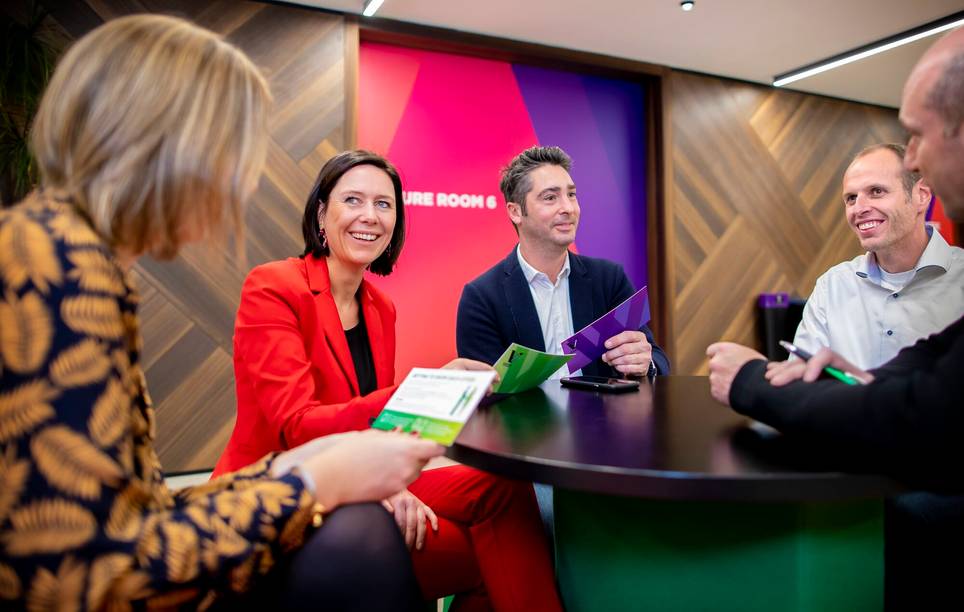Under the microscope: the challenges of managing a fast-growing company
It is the number one challenge facing companies looking to grow: finding the right people to ensure that their growth is sustainable. This is an issue currently being faced by Aalter-based software company ARDIS. However, it is not the only challenge they have to contend with. We hear what several Vlerick professors would advise.

Five years ago, Veronique Clarebout and Bern De Lille jointly took over ARDIS, which produces production software for the global sheet, bar and coil cutting industry. Thanks to this software, the company's customers are able to boost processing efficiency, while minimising losses. And they can manage their production as optimally as possible. Over the last five years, ARDIS has grown considerably, not only in terms of its customer base, but also its workforce, which has tripled in size. This evolution comes with its own challenges.
1. Finding the right people: make your DNA explicit
Many entrepreneurs, including ARDIS, are familiar with the struggles of finding the right people. “We have seen that it's important for people to fit within our DNA. If they share our norms and values, we expect them to do well at ARDIS”, explains Bern. “That being said, it is tricky to predict whether someone is the right fit for our company. At present, this is all based on gut feeling during job interviews.”

ARDIS' greatest challenge? Finding the right people with the right skills. Professor Veroniek Collewaert invites them to reflect on the DNA of their business.
Vlerick professor Veroniek Collewaert advises Bern and Veronique to make their norms and values more explicit. “One of our recent surveys revealed that company culture is the most important factor behind people choosing to work for a particular company”, she explains.
Veroniek Collewaert: “To boost intake of the right type of candidates, it can help to lay down four or five core values. These should reflect the kind of behaviours you want to see within your organisation. Translate these into two to three tangible behaviours per value, thereby allowing candidates to really know what is expected of them. By doing so, you are establishing a clear set of expectations.”
2. Balancing the hard and soft sides of growth
While the growth experienced by ARDIS is a positive thing, such growth can sometimes happen too fast, resulting in the entrepreneur feeling like they have lost control. “There are ways of mitigating this”, reassures Vlerick professor Yannick Dillen.

Balancing the hard and soft sides of growth
For Professor Yannick Dillen, rapid growth is not always essential. Instead, it is more important to strike a balance between the hard side and soft sides of growth.
“You have to try and find the right rate of growth, retaining a certain level of control”, he explains. “For that, it is important to pay attention not only to the hard side of growth, but also to the soft side. The hard side includes elements such as turnover or net profit, while the soft side includes aspects like customer satisfaction, product quality, employee satisfaction, etc.”

Want more entrepreneurial tips from the pros? Subscribe to the Vlerick Entrepreneurship Academy's monthly newsletter.
3. A new sales strategy
The software market is quietly shifting from a perpetual pricing to an SaaS (Software as a Service) pricing model – and ARDIS is also contemplating such a move. “With SaaS pricing, you can make your prices variable. However, this requires a different type of sales approach”, explains Professor Miguel Meuleman. “This is especially true if sales staff have become too accustomed to working with the old system, often making it difficult to make the switch.”

New sales strategy with SaaS pricing model
How do you move from perpetual pricing to SaaS pricing? Professor Miguel Meuleman shares his tips.
This all requires a change of mindset, clarifies Miguel Meuleman. “Customers can cancel their subscription on an annual, or even a month-by-month basis. This means that the relationship between you and your customers is all the more important, requiring you to actively engage in good customer relationship management.”
Want to know more about balancing the hard and soft sides of growth? Read it here.
